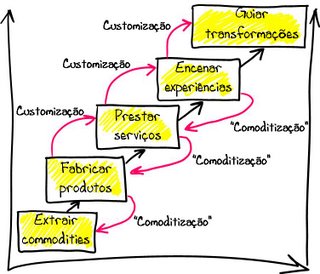.
Em "Business Strategy - Managing Uncertainty, Opportunity, and Enterprise" de J.-C. Spender encontro esta figura:
A figura lista 4 paradigmas acerca de como se aborda a estratégia. A abordagem escolhida pelos autores do texto do Público, referido na parte I desta série, e tão disseminada na nossa sociedade, é o paradigma A.
.
Segundo o paradigma A, o foco é a empresa e a realidade é objectiva.
"The Paradigm A implication is that the strategist must construct a logical theory of how to achieve the goal chosen—and articulate it into a plan. It assumes reasonable people will follow along willy-nilly because of what has been scientifically proven.Por isso, ouve-se, tantas e tantas vezes a afirmação, para mim "infantil":
...
Ultimately a well-constructed plan is a theory about how selected resources and their relationships must lead to the goal sought. The emphasis is on completeness and logicality and there is no distinction between theory/plan and strategy."
"É preciso que o governo defina uma estratégia para o país!"Como se a realidade fosse objectiva e igual para todos...
.
O paradigma B evolui um pouco:
"Paradigm B is more realistic because it seems to bring “real people” back in.A mudança do paradigma A para o paradigma B é pressionada pela falta de conhecimento objectivo completo. A realidade é tramada! O que é verdade hoje, amanhã é mentira! O que tomamos por Juno, afinal não passava de uma nuvem. As lacunas no conhecimento têm de ser preenchidas pelo julgamento do estratega com base na sua experiência. Assim, em vez do plano perfeito, aspira-se ao plano tão bom quanto possível.
...
presumes flexible and imaginative people are needed to provide creative inputs—for understanding is invariably incomplete and may not be rigorously logical. But it does not identify them or make them central to the analysis. OK, we discover our data is incorrect and our predictions do not turn out as expected. Likewise we are often ignorant of some of the necessary facts about the entities and their relationships until after we have acted. We get surprised. Then we muddle through.
...
Paradigm B does not hang on rigorous plans; just plans that are as-good-as-practicably-possible. It allows gaps, to be addressed later by competent and imaginative people. Many things will not be taken into consideration and the hope is that it will all work out well in the end. It is muddling through. Successful business people are those who make “good calls” in such situations, successfully judging which facts to take into account and which to ignore, and who guess well when there are no facts to be found."
.
Quanto ao paradigma C:
"Paradigm C moves away from the scientific methods as normally defined. It does not assume our socioeconomic world is comprised of objective facts about things and logical causal relations between them. Rather the strategist’s universe consists of ideas that lead people to do things, especially to produce and consume.E chegamos ao paradigma D:
...
In Paradigm C the strategy’s core is a production/consumption idea, the entrepreneur’s idea.
...
In Paradigm C tangible things, especially “resources,” matter strategically because they “carry” or “fasten” our expectations and desires.
...
Paradigms C and B both spin on strategic judgment. But in Paradigm C the judgment needed is not about what is missing from what is known or knowable about a real situation
...
Judgment is no longer subordinated to the logical plan. Rather the reverse. The strategy hinges on what people might be persuaded to think, how their expectations might be changed, and so induced to behave in a new way imagined by the entrepreneur."
"This is like Paradigm C in that it presumes the strategist’s world is made up of malleable people with changeable expectations rather than an unchangeable reality. But it goes beyond Paradigm C towards the logical limit that embraces the changeability of the entrepreneur her/himself in addition to the changeability of her/his world. Paradigms A, B, and C presume a stable entrepreneur with a chosen goal. In Paradigm A this goal drives the plan; in Paradigm B the plan + some judgments. In Paradigm C it is translated into an apparatus to persuade some other people to behave in a way that subordinates them to the entrepreneur’s goal."O que o paradigma A não prevê, não contempla é a surpresa, seja ela positiva ou negativa.
"Strategic work precipitates activity that goes beyond the possibilities theorized. Seeking surprise is part of the way we are, our restlessness and desire to inquire into and change (improve) the human condition. We are strategic animals and strive to learn more."


















%2006.21.jpeg)












